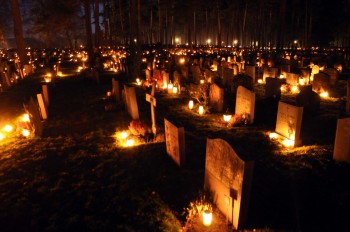 There’s a special kind of prayer I’ve discovered in my spiritual life. Despite being what I suspect is a fairly common type of prayer for many people, I don’t know if it has a name. (If any of you good gentle readers have any insight, please let me know!) Basically, it’s a prayer where I don’t exactly know what I’m praying for, but I just want God to make it better, somehow.
There’s a special kind of prayer I’ve discovered in my spiritual life. Despite being what I suspect is a fairly common type of prayer for many people, I don’t know if it has a name. (If any of you good gentle readers have any insight, please let me know!) Basically, it’s a prayer where I don’t exactly know what I’m praying for, but I just want God to make it better, somehow.
I’ve prayed for beloved victims of serious accidents, not knowing what outcome I want; death would mean the possibility of meeting our Lord, but that’s not always a sure thing, and I — perhaps selfishly — don’t want them to go . . . and praying for death isn’t right. Recovery is unlikely, and almost certainly not to a level of functionality they would enjoy; if they’re in a coma or brain dead, it’s even more agonizing. Praying for a full miraculous bolt-from-the-blue recovery is possible — Jesus teaches us to pray for what we really want — but, frankly, I don’t think I have the level of faith to even consider that a possibility. Praying for God’s will to be done and for strength for all involved is perhaps my usual go-to prayer in less-dire situations, but it feels hollow when the situation is serious or complex enough.
So, in such situations, I often find myself saying, “Please, God, fix this. Make this better! I don’t know what I want, or what would make things better, but You’re infinitely smarter than me . . . Fix this!”
I was reminded of this as I reflected on today’s readings. Today is All Souls Day, when we pray for all the departed, often with a special emphasis on family. My sister passed away recently . . . unexpectedly, and really without warning. With her departure, I found myself praying for her, but I don’t know exactly what I’m praying for. There are only three possibilities according to the Catholic faith:
- She’s in heaven. If so, then my prayers aren’t really needed; she’s in heaven! Like today’s reading from the Book of Wisdom says, “The souls of the just are in the hand of God, and no torment shall touch them.” In this case, she’s part of the communion of saints, and our prayers should help connect her to us, enabling her to do God’s will.
- She’s in hell. It’s certainly a sad thought, but it’s a possibility that we need to be aware of. In that case, my prayers won’t really do much. At best, I’d hope that God would interpret my prayers and help others who may be similarly in danger in our mortal world.
- She’s in purgatory. That seems a likely scenario, and the situation where my prayers would actually be useful to her.
Certainly it’s in God’s plan for us to join Him in Heaven. As Jesus noted in today’s Gospel selection from John, “For this is the will of my Father, that everyone who sees the Son and believes in him may have eternal life, and I shall raise him on the last day.” But we know there are those who have not lived with the will of the Father in mind, who will have eternal life denied them. And we know there are those who have lived imperfectly in God’s light, who will still have the promises of heaven fulfilled, but who need purification from those imperfections that made them less than saints at death.
All of us are the product of a lineage of living and departed souls. Praying for the departed is right and just, even if we don’t know exactly what we’re praying for. On today, this All Souls Day, let us remember the awesome power of God to interpret our prayers when we ourselves aren’t sure. For those in purgatory who await the ultimate bliss of unification with God, may our prayers help send them to the Father’s loving arms. For those who have passed before us who are with God directly, may our prayers be put to good use in the greater communion of saints . . . perhaps to help those still living who may be in danger of a more ruinous final fate.
Today’s readings: Wis 3:1-9; Ps 23:1-3A, 3B-4, 5, 6; Rom 5:5-11; Rom 6:3-9; Mt 25:34; Jn 6:37-40
